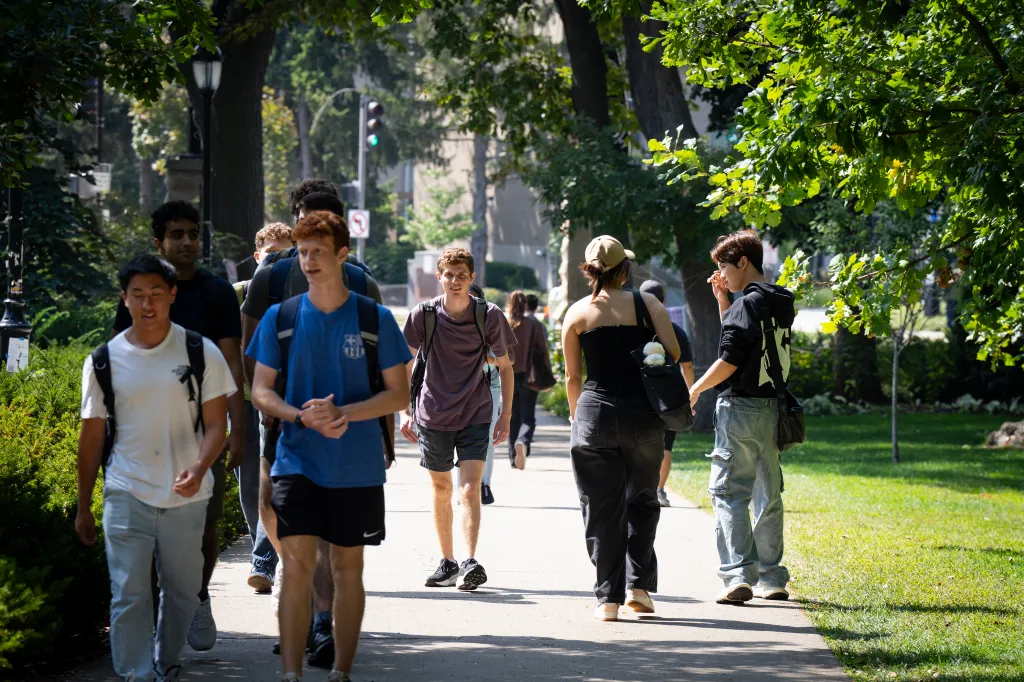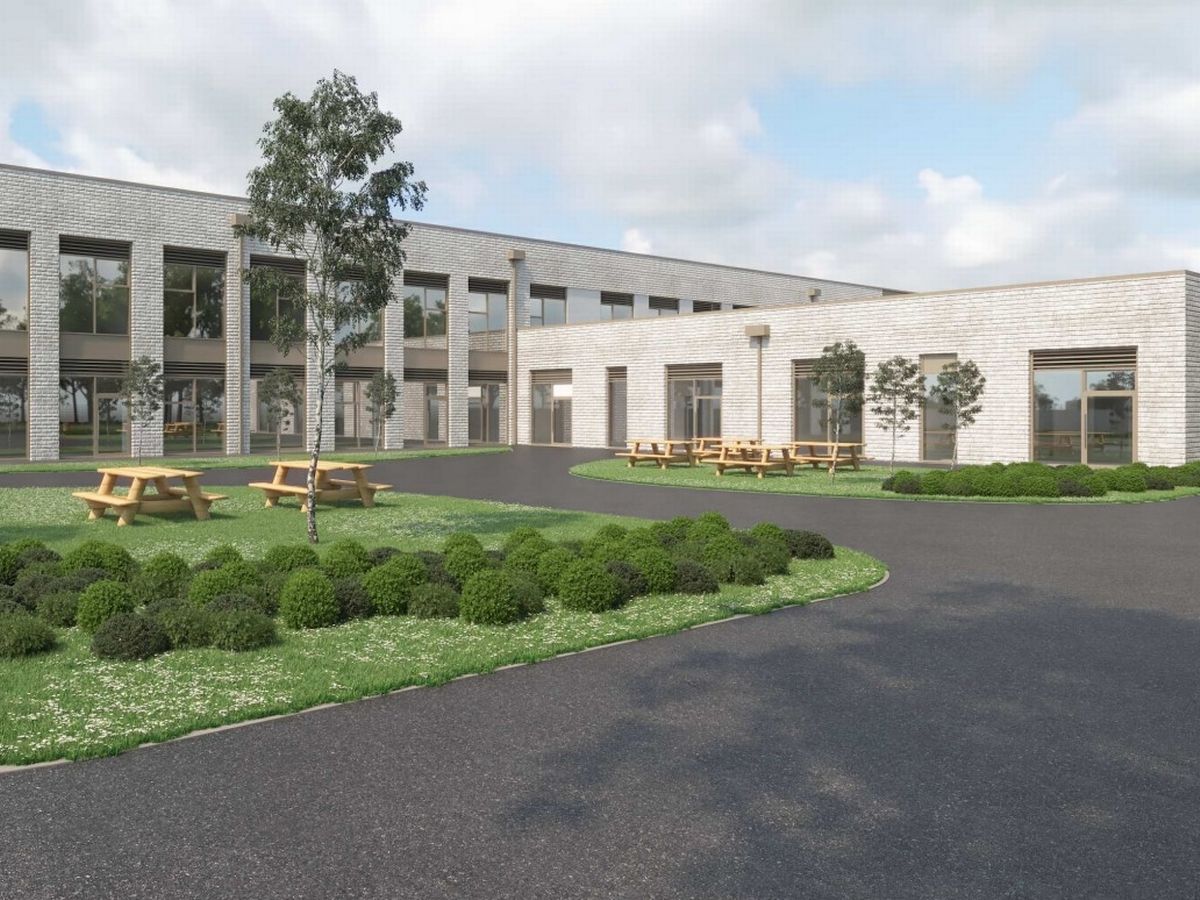
The sun beat down on Northwestern University’s lakefront campus Friday, as students hurried to classes in the first week of the academic year.
Though the Evanston school has grappled with a flurry of challenges in recent months — including a $790 million federal funding freeze and the sudden resignation of President Michael Schill — the mood was light on campus ahead of the weekend.
Most students were unfazed by the mounting federal pressures, and knew little of Schill’s interim successor.
“I think outside looking in, I know a lot of people are probably like, ‘Oh, Northwestern is going through so much, it’s probably ruining the atmosphere,’” said Chelsea Robinson, a 19-year-old journalism major, as she scrolled through her laptop. “Honestly, I think we all just do our part to stay focused.”
“I don’t really keep up with the details of it all,” said Iryna Panchuk, an 18-year-old biomedical engineering major, studying outside of the school’s main library. “Whatever happens, happens, and we try to keep trudging along.”
Like elite universities across the country, Northwestern has faced heightened scrutiny under President Donald Trump, as part of a broader push to bring higher education in line with his political priorities. The funding freeze began in April, deeply unnerving faculty and research staff.
Then, under intense pressure from Trump and House Republicans, Schill announced this month that he would step down. Former President Henry Bienen, who helmed the school from 1995 to 2009, was named as his replacement days later.
Bienen, 86, returns to campus at the center of a high-stakes funding battle with the White House.
“I know nothing about him,” said Silas Colombara, a 21-year-old economics and anthropology major. He studied at a table in a shady clearing. “It is ‘Bienen,’ right?”
Other students expressed a deep sense of uncertainty for the year ahead. Beside the Rock, theater majors Ien Ruark, 19, and Helen Davis, 21, advertised their upcoming production of the musical “Pippin.” Sitting at a folding table strewn with clipboards, they said they felt frustrated that Schill did not directly address what prompted his resignation.
“He’s kind of just running away,” Ruark said. “We feel like we’re not being told a lot. We’re kind of being left in the dark.”
In his message to the Northwestern community, Schill wrote that it was “the right time for new leadership.” He said he would take a sabbatical before returning to teach at the Pritzker School of Law.
Still, Ruark and Davis empathized with Schill’s position, particularly as he faced attacks from Republican lawmakers. In August, the Northwestern leader appeared again before a congressional committee to speak on allegations of antisemitism on campus.
“If I was him, I would have resigned,” Davis said. “It probably was really taxing.”
Juniper Shelley, a 20-year-old social policy major, worries that Schill’s departure may be a step back for the university. When she saw the announcement, she said it felt like a sign of acquiescence to Trump. Bienen, who was president for 14 years, seems like “a safe choice,” she added.
She noted the killing of right-wing activist Charlie Kirk last week and its aftermath may further threats to academic freedom.
“I think any future president will be a step back from liberalism,” Shelley said.
On his walk to class, 19-year-old Simon Olshan-Cantin paused across from Deering Meadow. The history major mused over how Bienen may seek to restore the paused research funding.
“I’m a little concerned, because I feel like Schill was doing his best to resist the pressures of the Republican president and Congress,” Olshan-Cantin said.
Across the country, elite universities have employed different approaches to restore frozen funds. Columbia University, for example, brokered a deal with the White House, agreeing to pay hundreds of millions to the federal government and change certain campus policies. Harvard University, meanwhile, filed suit against the Trump administration.
“I’m concerned that (Bienen) is going to take a Columbia route, more than a Harvard route,” Olshan-Cantin said.
In a video message Tuesday, Bienen welcomed students back to campus and described a deep sense of pride in the school, its research and its students. He seemed to allude, at least glancingly, to the pressures at the federal level.
“Yes, we have our challenges, but we will meet them together to ensure our university remains a thriving center for independent thought, discovery and creation, now and for generations to come,” Bienen said.
Bienen was Northwestern’s third longest-serving president when he retired 16 years ago. A political scientist, Bienen was previously dean at the Princeton University School of Public and International Affairs. After his initial retirement, was president of the Poetry Foundation from 2015 to 2020.
His legacy remains deeply entwined with Northwestern. In 2008, the school’s board of trustees renamed the Bienen School of Music in his honor.
Back by the Rock on Friday, Ruark pointed to a rusting plaque on University Hall, engraved with Bienen’s name.
“His name is right there,” Ruark said.
Beside the plaque, dated 1996, was a purple newsstand for the student newspaper, the Daily Northwestern. The front page, featuring a large photo of Schill, was plastered against the glass: “Tenure of Turmoil,” it read.



